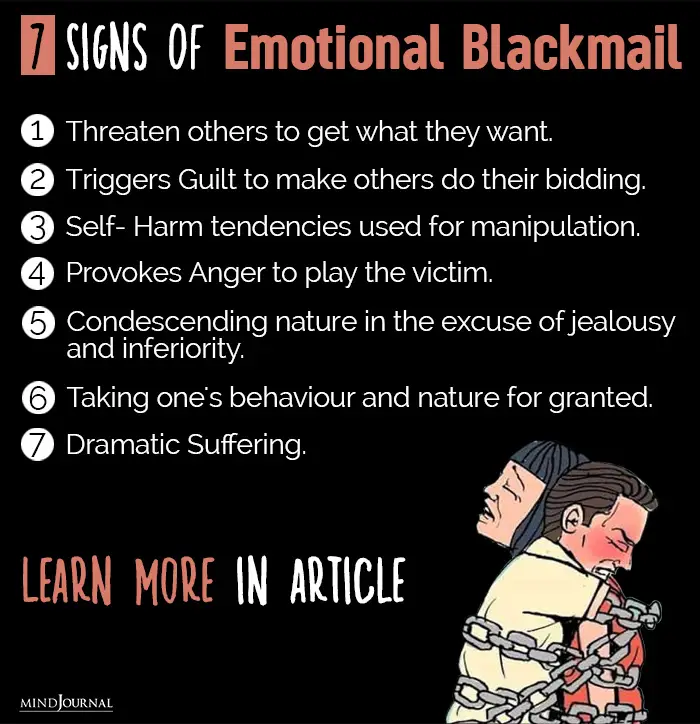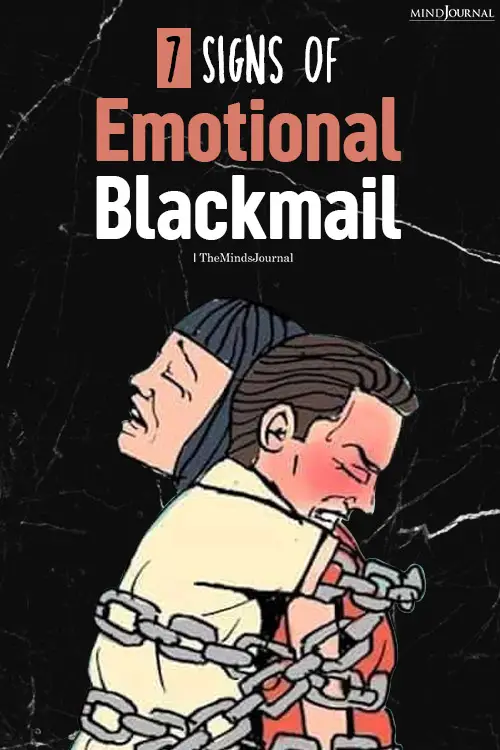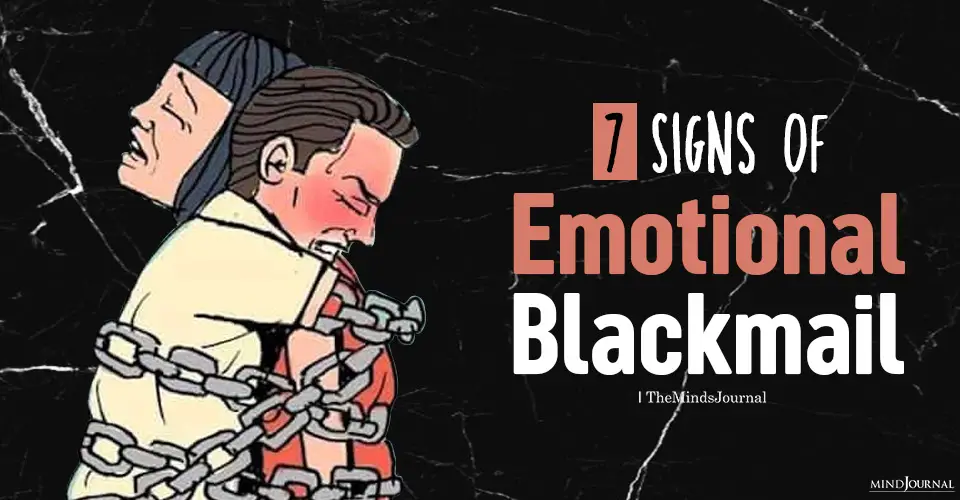You’re in a relationship, romantic or not. It has highs and lows, just like every other relationship. While everything is all good and sound, there seems to be no inconvenient gestures or actions from the other person as such. But when the low points arrive, emotional leverage comes into play. Blackmailing on the grounds of all the emotional triggers that the other person is aware of, begins.
It becomes a passive-aggressive competition where the aggregator starts to down the other person in the relationship. Statements like “Do this, or else..!!” starts to appear and the comfort between them is instantly replaced by a feeling of being sabotaged.
This is called Emotional Blackmail. It describes a style of manipulation where someone uses your feelings as a way to control your behavior or persuade you to see things their way or worse, wants you to do their bidding. As subtle as it sounds, emotional blackmail is a very generic and common nature for people to get what they want. And destroy even the best of bonds on its way.
Emotional Blackmail : Definition And Description
Like typical blackmail, emotional blackmail involves someone trying to get what they want from you. But instead of holding secrets against you or any direct form of aggression, they manipulate you with your emotions and weak points and worse, your trigger points.
Leaders in the field, Susan Forward and Donna Frazier identify the power dynamic that occurs in such manipulation. They suggest that emotional blackmailers employ a fear – emotion – guilt tactic to get what they want.
FOG is a term named by Forward, suggesting that fear, obligation, and guilt are the dynamics in emotional blackmail between the manipulator and the victim. The acronym FOG also accurately describes the confusion and lack of clarity and thinking that can occur in these interpersonal dynamics. Emotional blackmail can create a fog and contribute to feelings of fear, obligation, guilt, and anxiety.
According to Forward, emotional blackmail occurs in close relationships. The manipulator leverages knowledge gained about the victim’s fears. Blackmailers will use the information they learn about what the victim fears to manipulate them.
Forward suggests that one of the most painful elements of emotional blackmail is that they use personal information about the victim’s vulnerabilities against them. Another trigger blackmailers will use is putting the victim’s sense of obligation to the test. They will commonly create undeserved guilt and blame to attribute their problems to the victim.
Read The 5 Qualities Of Emotionally Mature People
Forward And Frazier’s 4 Types Of Emotional Blackmail
Forward and Frazier recognize four types of emotional blackmailing, each with varying manipulation tactics.
1. Punishers –
Punishers operate with a need to get their way, regardless of the feelings or needs of the other person. Their motto is “my way or the highway.” Punishers will insist upon pushing for control and getting what they want with threats to inflict damage or harm.
2. Self – Punishers –
Individuals can make threats of self-harm if the partner does not comply with what they want.
3. Sufferers –
This is the voice of a victim conveying guilt on the partner if they do not do what is demanded. If they don’t comply, there is a suggestion that their suffering will be the others’ fault.
4. Tantalizers –
This can be the most subtle and confusing form of manipulation. There is a promise of what will be better if they comply. It sparks hope yet is still connecting a threat to the demand.
Read The Most Emotionally Intelligent Zodiac Signs: RANKED From Most To Least
7 Signs Of Emotional Blackmail

As emotional blackmail goes, there can be a huge number of possible ways to go about it and it can be modified as per the doer’s intention and situation. But usually, there happens to be a constant recurrence of the following signs of blackmailing which are just as basic as they are common.
1. Using Threats
It’s pretty common for abusers to threaten others with violence to get what they want. And what better to use in order to threaten you and make you feel genuinely scared of the consequences than your loved ones or things. That is a ground that is most common among emotional blackmailers and more often than not, it does get the job done.
Sometimes the threat of violence or intimidation doesn’t come in words. If the abuser has already demonstrated a willingness to get loud, slam doors, punch walls, and glare at you as though his/her tantrum was your fault, this behavior can be stressful enough and casts a large, looming shadow.
2. Regularly Triggering Guilt
In this scenario, the blackmailer does not even know they’re using your guilt to get the better of your emotions. Half of the time, they end up using it just to avoid disappointment shoved in their faces or the very inability to accept the same. In a situation where it is their reputation at stake and you are not doing something as per his/her bidding, the emotional blackmail comes into play where you’re made to feel like “it is happening because of you”.
And it is the absolute worst. With or without consciousness.
3. Warnings of Self-Harm
Some emotional blackmailers will threaten to harm or even kill themselves to make you do what they want , whether that’s to come back to them, to forgive them for hurting you, or to get a job done that you wouldn’t do in a normal situation.
If you call their bluff and walk away, they might harm themselves just so they can blame you for it and see if you’ll accept responsibility. If you do, they’ve got you right where they want you. If you don’t, they have no power over you.
Read Poems play, Story time: The self-harmer
4. Provoking Anger
Some emotional blackmailers will deliberately provoke you into anger. They will do or say hurtful and offensive things so that when you react in anger, they can play the victim or “the calm one” who is the bigger person.
Then they manipulate you into doing something they want as atonement/compensation for your anger and misbehaviour.
If you’re the one who loses control, they use that against you. If you keep your calm, and they lose control, they blame you for that, too. Whether it’s your anger or theirs, you’re the guilty one. It’s a vicious cycle and a relatable one. A vast majority would agree.
Read How Unexpressed Anger Impacts Your Mind
5. Condescend as Jealousy and Inferiority
Emotional blackmail can also involve jealousy and the fear of loss. Rather, it is one of the most impactful and long-lasting forms of emotional blackmail.
Using the logic of the “other person being jealous” to justify their own misdeeds or misdemeanour, then in case the allegation fails, terming him/ her to be paranoid, whimsical and insecure just to have had issues with a legitimate misconduct.
It is a very, very nasty business. Which ultimately leads onto sheer inferiority complex and a fear of losing the person. Thus wiping off all the legitimate worries and allowing the misfortune to carry on.
The loop of emotional blackmail continues, as a result.
6. Taking Your Behavioural Patterns for Granted
When you show the other person you’ll eventually concede, they know exactly how to play similar situations in the future.
Over time, the process of emotional blackmail teaches you that it’s easier to comply than face persistent pressure and threats. You may come to accept that their love is conditional and something they’ll withhold until you agree with them.
They may even learn that a particular kind of threat will get the job done faster. As a result, this pattern will probably continue.
7. Dramatic Suffering
This is a way of emotional blackmail where, in any other time or situation, you would not comply with your aggressor.
And the matter of fact? The person knows that.
As a result, he/she puts the ‘Dramatic’ cap on and creates a scene or enacts a suffering very dramatically, preferably in a public place so that it minimises the chances of you saying no and denying the compliance.
Quite the strategist for a dramatic person, isn’t it. But it is what it is.










Leave a Reply
You must be logged in to post a comment.